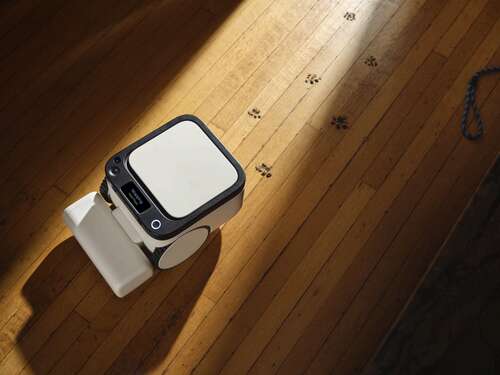
Matic
Remember that time a Roomba recorded a lady on the toilet, and images from the video ended up on Facebook? It’s the type of horror story that rarely happens, yet once is enough to make you second-guess the smart home products you bring into your personal spaces, forever.
That’s why I was so intrigued by Thursday’s announcement of Matic. It’s an upcoming robot vacuum and mop that has been in development for six years by ex-Google Nest engineers Mehul Nariyawala and Navneet Dalal. It stands out from other consumer options because of the privacy it offers. The device doesn’t require a connection to the Internet or cloud and performs all processing on-device.
Cloud-free cleaning
All of the mapping Matic does occurs on the device’s hardware, which Dalal told TechCrunch is comparable to that of an iPhone 6. Other robot vacuums can work without the cloud, but then their mapping features won’t work.

Matic’s battery claims to last for 2.5 hours of vacuuming or 3 hours of mopping. Like some other robovacs, Matic’s is supposed to dock itself to charge and finish cleaning where it left off after it’s charged.
Matic
Connecting as many gadgets and devices as possible, including ones that have worked well as “dumb devices,” has long been warned against by cybersecurity and privacy experts. By avoiding a mandatory web connection, Matic can stay clear of the privacy nightmares that have been associated with numerous smart home devices and offer a unique package for people interested in an autonomous cleaning machine but don’t want to give away their sense of privacy.
Nariyawala told me via email:
Both Navneet and I have kids/pets, and we never felt comfortable with the idea that we have to jeopardize our privacy to get a little bit of help from technology to do our chores. We did not want our family data to end up in the cloud or China.
Matic’s debut comes as Amazon is trying to buy iRobot (the deal is currently under investigation by European antitrust regulators). The acquisition announcement set off privacy alarms everywhere, and people cringed at the idea of Amazon gaining access to maps of millions of homes. Beyond the obvious creepiness of Amazon having an intimate knowledge of your home and leveraging that to try to sell you more stuff, Amazon also has a reputation for sharing data with the police. And as noted by TechCrunch, a 2017 Reuters report said iRobot was considering sharing its maps, “with customer consent,” with tech giants. Matic’s described approach would put to rest fears of roaming data collectors picking up customer intel alongside dust bunnies.
Nariyawala told me that while Matic can’t speak for other companies, he’d guess that most don’t know how to make a robot vacuum that’s not reliant on the cloud. He explained that “doing everything on the edge device is MUCH harder than spinning up another GPU in the cloud. It takes a longer time to develop on the edge device, and requires precision engineering and an extreme focus on software optimization.”
Another possibility is that other companies don’t want to sell a robovac that doesn’t require a web connection.
Nariyawala said: “Unfortunately, some companies are far more interested in collecting, using, and selling users’ data to generate revenue than solving the actual user problem.”
That said, Matic also doesn’t support voice assistants like Amazon Alexa or Google Home. Nariyawala told me that could change in the future, as long as Amazon or Google doesn’t “require us to jeopardize users’ privacy by forcing us to share data.”
Nariyawala added that Matic’s local processing enables constant autonomous map updates.
“By having entire perception tech on the device, we were forced to optimize the entire tech stack to run on a limited amount of computes instead of expensive cloud algorithms,” he said.
Further, freedom from the web means Matic’s performance won’t be affected by slow or non-functioning Internet, Wi-Fi dead zones, or power loss.

